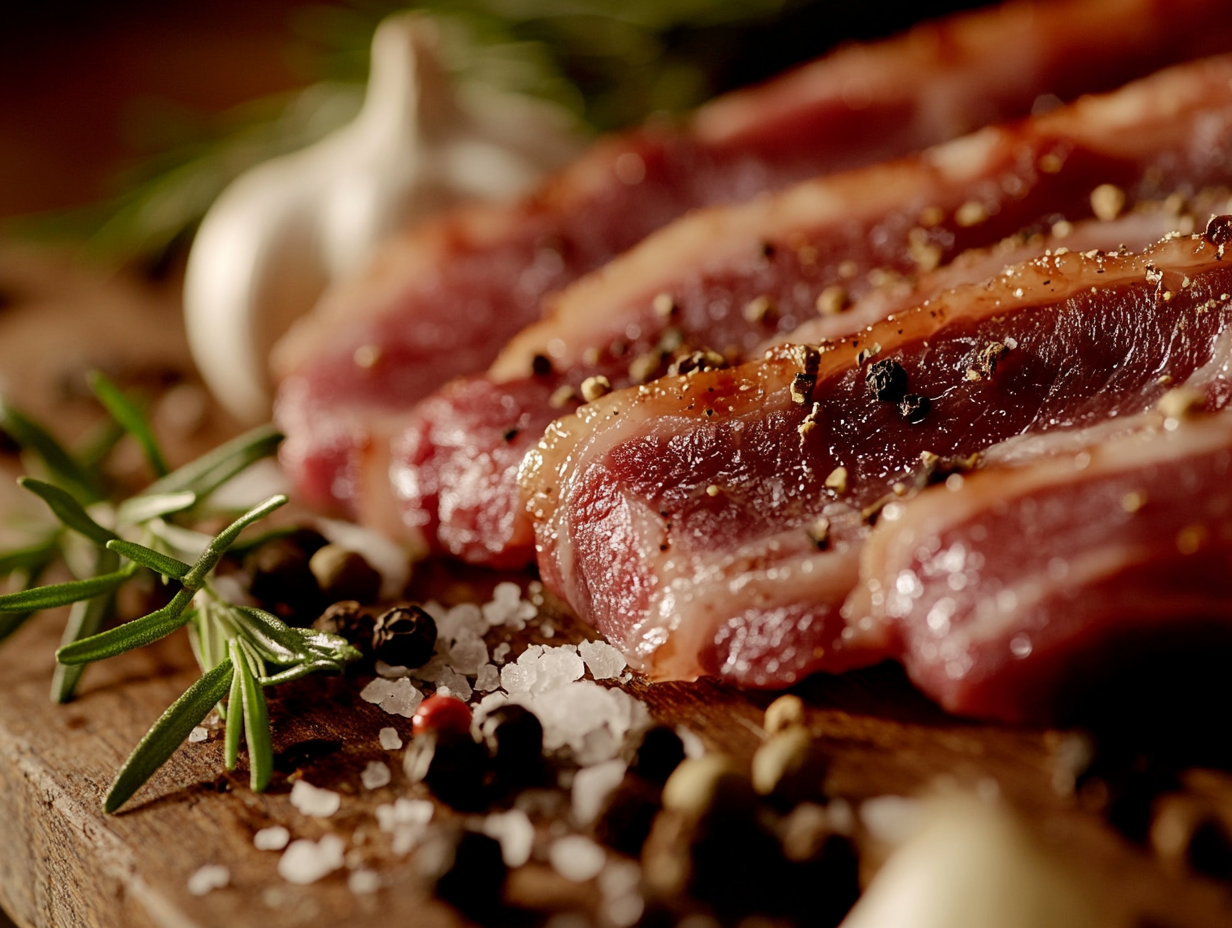Beef bacon, a tempting alternative to the ubiquitous pork bacon, has grown in popularity among food lovers seeking unique flavors or alternatives to pork. Despite its appeal, many people struggle to find it readily available in stores or restaurants. In this article, we dive deep into why beef bacon is hard to find, exploring the intricate web of supply chain issues, cultural preferences, production hurdles, and emerging market trends.
What is Beef Bacon?
The Definition and Origins of Beef Bacon
Beef bacon is a cured, smoked, and sliced meat product made from beef instead of pork. Typically, it is prepared using fatty cuts such as the brisket, navel, or short plate. Although it resembles pork bacon in preparation and appearance, its flavor is distinct, offering a richer, beefier taste.
How is Beef Bacon Made?
The process for making beef bacon involves curing the meat with salt, sugar, and spices, followed by smoking it to enhance flavor. Producers must carefully select beef cuts with the right balance of fat and meat to mimic the crispy texture and savory taste of pork bacon.
Cultural Preferences and Their Impact
Pork Bacon’s Historical Dominance
For centuries, pork bacon has been a staple in Western cuisine, deeply integrated into breakfast traditions, recipes, and even cultural identity. This dominance has limited the demand for alternative options like beef bacon, relegating it to niche markets.
Dietary and Religious Considerations
In contrast, communities adhering to halal or kosher dietary laws avoid pork entirely. These communities often turn to beef bacon as a permissible alternative. However, the demand from these groups alone hasn’t been enough to push beef bacon into the mainstream.
Economic Challenges in the Beef Bacon Market
High Production Costs
Beef is generally more expensive than pork due to factors like feed, land requirements, and longer rearing periods. Transforming beef into bacon further raises production costs due to specialized curing and smoking processes.
Smaller Market Size
The market for beef bacon is limited compared to pork bacon. With fewer consumers demanding it, producers face challenges in achieving economies of scale, which further increases the retail price and limits its availability.
Supply Chain Issues Affecting Beef Bacon
Beef vs. Pork Availability
Beef requires larger cuts and more resources to process, making it less economically efficient than pork. While pork bellies are abundant and perfect for bacon, beef cuts suitable for bacon, such as brisket or navel, are often in higher demand for other uses like steaks or ground beef.
Distribution Challenges
Mainstream grocery stores prioritize high-demand products, leaving niche items like beef bacon to specialty stores or online retailers. Additionally, regional differences in taste preferences make beef bacon less likely to appear in areas where pork bacon reigns supreme.
Production Hurdles in Making Beef Bacon
Choosing the Right Cuts
Unlike pigs, cows do not have a single cut analogous to pork belly, the traditional source of bacon. Producers must use brisket, navel, or similar cuts, which require more work to achieve the right texture and fat content.
Specialized Equipment and Expertise
Processing beef into bacon requires adjustments in curing, smoking, and slicing techniques. This specialized approach increases production complexity and cost, making beef bacon less appealing for mass-market producers.
How Consumer Trends Affect Beef Bacon

Rise of Alternative Diets
With the increasing popularity of diets like paleo, keto, and carnivore, there is growing interest in alternatives to traditional pork bacon. Beef bacon fits well within these dietary preferences, but its higher price point remains a barrier.
Demand for Clean Label Products
Modern consumers are increasingly drawn to clean-label products free of artificial preservatives and additives. Beef bacon producers are innovating to meet this demand, but these enhancements can drive up prices even further.
Beef Bacon’s Flavor Profile and Culinary Uses
What Does Beef Bacon Taste Like?
Beef bacon offers a robust, meaty flavor with a hint of smokiness. Its firmer texture and slightly lower fat content give it a distinct chew compared to the crispy crunch of pork bacon.
Creative Ways to Use Beef Bacon
Beef bacon is versatile in the kitchen. It can be used in sandwiches, wrapped around vegetables, or as a topping for burgers and salads. Its richer flavor makes it a standout addition to gourmet recipes.
Comparing Beef Bacon to Other Alternatives
Beef Bacon vs. Pork Bacon
While pork bacon is fattier and crispier, beef bacon is meatier and offers a unique taste. Both have their strengths, but beef bacon caters to a different audience, including those with dietary restrictions.
Beef Bacon vs. Turkey Bacon
Turkey bacon is another popular alternative, often marketed as a healthier option. However, it lacks the bold flavor and satisfying texture that beef bacon provides.
Availability of Beef Bacon Worldwide
Regional Availability
In the United States, beef bacon is more common in areas with large halal or kosher communities. In contrast, it is more widely available in the Middle East, where beef is a primary protein source.
Online Retailers and Specialty Stores
For those struggling to find beef bacon locally, online retailers and specialty markets offer a convenient solution. These platforms often stock a variety of brands and cuts, catering to niche demand.
The Future of Beef Bacon

Potential for Growth
As dietary trends shift and consumers explore new options, the demand for beef bacon may rise. Producers investing in efficient production methods and broader distribution could make beef bacon more accessible in the coming years.
Overcoming Barriers to Entry
To gain traction, beef bacon must compete with the affordability and availability of pork bacon. Innovations in production and marketing will be crucial for expanding its market share.
Conclusion
Beef bacon is a hidden gem in the culinary world, offering a unique and robust alternative to its pork counterpart. However, its scarcity is the result of multiple interconnected factors, including higher production costs, limited demand, and the dominance of pork bacon in traditional cuisine. These challenges keep beef bacon off the shelves of many grocery stores and limit its accessibility to niche markets.
Despite these hurdles, beef bacon holds untapped potential. As consumers increasingly seek alternatives that align with specific dietary or religious requirements, the demand for beef bacon may grow. Its versatility, rich flavor, and ability to cater to diverse audiences make it a product worth championing. Producers who can navigate the economic and logistical challenges of manufacturing beef bacon stand to gain from this emerging interest. Check these articles for further insights into beef bacon’s composition and preparation methods:
FAQs
Why is There No More Beef Bacon?
Beef bacon has not disappeared entirely but remains scarce due to a combination of production challenges, limited demand, and cost inefficiencies. Unlike pork bacon, which is mass-produced to meet widespread demand, beef bacon caters to a smaller niche market. Producers often prioritize cuts of beef like brisket or navel for other high-demand products, such as steaks or ground beef, leaving less availability for bacon production. Additionally, the specialized curing and smoking process required for beef bacon further restricts its production, making it a rarity in mainstream markets.
Does Anyone Make Beef Bacon?
Yes, beef bacon is still produced by a variety of manufacturers, particularly those catering to halal, kosher, or specialty markets. Companies specializing in alternative meats, including halal-certified and kosher-certified brands, make beef bacon to serve communities that do not consume pork. Small-scale butchers and specialty food producers also craft artisanal beef bacon for niche audiences. These products are often available online or at specialty stores rather than large grocery chains.
Can You Get Beef Bacon?
Yes, beef bacon is available, but you may need to look beyond traditional grocery stores to find it. Here are some common sources:
- Halal Markets: Many halal butchers and stores stock beef bacon for their customers.
- Kosher Markets: Kosher-certified stores often carry beef bacon as a pork alternative.
- Specialty Stores: Gourmet and artisan food shops may offer beef bacon, especially those catering to unique dietary needs.
- Online Retailers: Several online meat suppliers and halal-certified platforms ship beef bacon directly to consumers.
While it may not be as easily accessible as pork bacon, it is possible to source beef bacon with some effort.
Why is Beef Bacon So Expensive?
Beef bacon is more expensive than pork bacon due to several factors:
- Cost of Beef: Beef is generally more expensive to raise and process than pork. The feed, land, and longer growth period required for cattle contribute to higher prices.
- Specialized Cuts: Cuts like brisket or navel, used to make beef bacon, are also in high demand for other premium beef products, driving up their cost.
- Labor-Intensive Production: Curing and smoking beef bacon requires specialized techniques to replicate the texture and flavor of pork bacon, adding to production expenses.
- Smaller Market: Limited demand means producers can’t achieve the economies of scale that make pork bacon more affordable. As a result, beef bacon remains a niche product with a higher price tag.
Is Beef Bacon Halal?
Yes, beef bacon can be halal, provided it meets Islamic dietary requirements. For beef bacon to be halal, the following conditions must be met:
- The beef must come from an animal slaughtered according to halal guidelines, with a certified halal method.
- The bacon must not contain any prohibited ingredients, such as alcohol in the curing process.
Halal-certified beef bacon is widely available in halal markets and online. Always look for certification to ensure it complies with Islamic dietary laws.
How to Make Beef Bacon
Making beef bacon at home is a rewarding process that allows you to customize the flavor and texture. For a detailed recipe, refer to How to Make Beef Bacon Recipe: A Delicious Homemade Guide.
What are the health benefits of beef bacon?
Beef bacon may have slightly less fat than pork bacon, depending on the cut, but both are processed meats and should be consumed in moderation.

